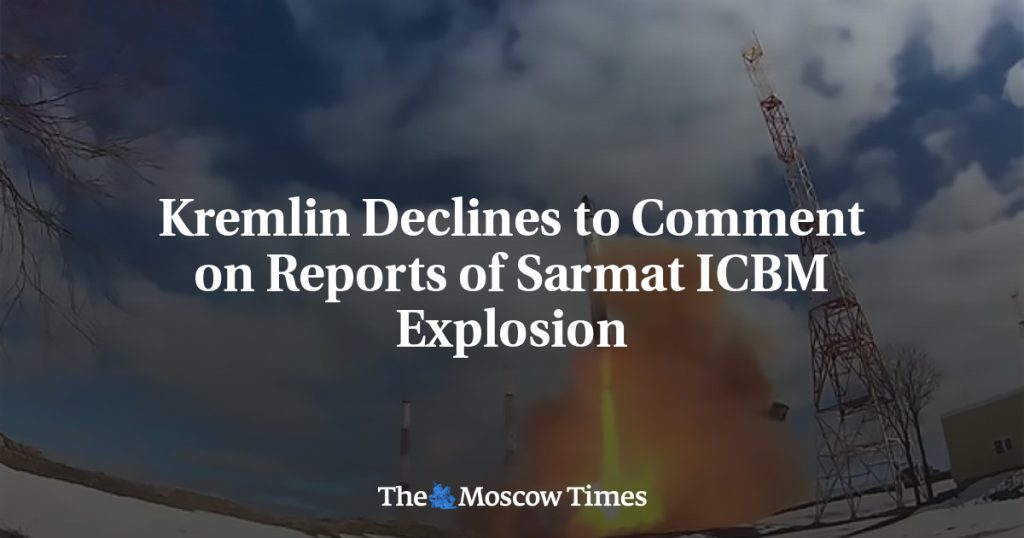The Kremlin refrained from commenting on reports of an explosion that occurred during a test of Russia’s next-generation Sarmat intercontinental ballistic missile. Satellite images from the Plesetsk test site in the northern Arkhangelsk region revealed a large crater, suggesting a failed Sarmat test flight or a defueling incident after an aborted launch. Russian authorities, including Kremlin spokesman Dmitry Peskov, stated they had no information on the matter and advised reaching out to military officials for clarification. The Sarmat missile, also known as “Satan 2” by Western analysts, weighs over 200 metric tons and has the capability to carry multiple nuclear warheads. Its design focuses on evading defense systems through a short initial boost phase to limit surveillance tracking time.
Last September, Russia’s space agency Roscosmos announced that the Sarmat missile was operational and ready for combat duty after being first unveiled by President Vladimir Putin in 2018. This announcement came amidst heightened tensions following Russia’s invasion of Ukraine, with Putin making veiled nuclear threats to Kyiv’s Western allies. He emphasized the invincibility of advanced missiles like the Sarmat, Kinzhal, and Avangard. The Sarmat missile, in particular, poses a significant threat due to its size, weight, and nuclear warhead capacity, making it a key component of Russia’s strategic nuclear arsenal. The missile’s ability to evade defense systems adds to its strategic importance in potential conflict scenarios.
The incident at the Plesetsk test site has drawn attention from arms experts and analysts, who speculate about the nature of the explosion and its implications for the Sarmat missile program. The presence of a large crater in satellite images suggests a significant event that could impact the development or testing of the missile. The lack of official information from the Kremlin highlights the secretive and sensitive nature of Russia’s military programs, particularly concerning advanced weapons systems like the Sarmat. Any disruptions or failures in testing could lead to delays in the deployment of the missile or necessitate further refinement of its design and technology.
The ongoing conflict between Russia and Ukraine has raised concerns about the potential use of advanced weapons, including nuclear missiles, in the region. Putin’s rhetoric emphasizing the capabilities of weapons like the Sarmat as “invincible” adds to the uncertainty and fear surrounding the situation. The international community closely monitors any developments related to Russia’s missile programs, especially in light of recent geopolitical tensions and military actions. The Sarmat missile, with its significant destructive power and strategic importance, represents a significant element of Russia’s military strategy and deterrence capabilities.
The designation of The Moscow Times as an “undesirable” organization by Russia’s Prosecutor General’s Office underscores the challenges faced by independent journalists and media outlets in the country. The labeling of The Moscow Times as a “foreign agent” and the criminalization of its work reflect the authorities’ efforts to suppress dissenting voices and limit critical reporting. Despite these obstacles, the journalists at The Moscow Times remain committed to providing accurate and unbiased reporting on Russia, highlighting the importance of independent journalism in the face of repression. Support from readers is crucial to sustaining independent media and defending the principles of free speech and transparency in challenging environments like Russia.
The plea for support from The Moscow Times acknowledges the crucial role that independent journalism plays in promoting accountability, transparency, and democracy. The ongoing repression and censorship of independent media in Russia underline the importance of standing up for press freedom and supporting outlets that strive to report the truth and hold those in power accountable. By supporting organizations like The Moscow Times, readers can help ensure that independent journalism continues to thrive and serve as a vital source of information in repressive environments. The call to action highlights the power of individual contributions in defending the values of open, independent journalism and resisting attempts to silence dissenting voices.














